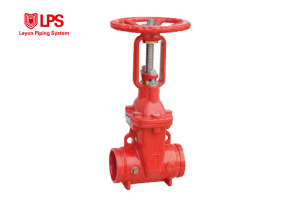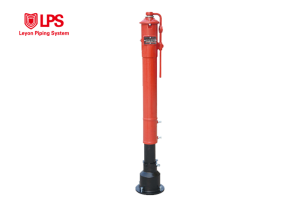Leyon Flanged NRS Gate Ductile Iron Resilient Seat Gate Valve
Leyon Flanged NRS Gate Ductile Iron Resilient Seat Gate Valve
Key Components
- Body Material: Ductile Iron
- Description: The valve body is made from ductile iron, a material that offers higher tensile strength, impact resistance, and flexibility compared to traditional cast iron.
- Benefits:
- Superior resistance to mechanical stress and shock.
- Higher pressure and temperature resistance than gray cast iron.
- Better resistance to corrosion when coated (e.g., with epoxy coating) for use in water systems.
- Gate (Disc)
- Description: The gate, often made of ductile iron, is fully encapsulated in a resilient material (commonly EPDM rubber) to provide a bubble-tight seal.
- Benefits:
- The resilient material allows for a tight, leak-proof seal.
- Reduces wear and tear on the sealing surfaces, increasing durability and lifespan.
- Non-Rising Stem (NRS)
- Description: Unlike rising stem valves, the stem remains stationary as the gate moves up and down.
- Benefits:
- Space-saving design: Ideal for installations in confined spaces or underground systems where vertical space is limited.
- Protected stem threads: Since the threads are inside the valve body, they are less exposed to dirt, corrosion, and mechanical damage.
- Resilient Seat
- Description: The resilient seat is typically made from rubber (e.g., EPDM), which is molded onto the gate.
- Benefits:
- Provides a tight shutoff without metal-to-metal contact.
- Reduces leakage and offers a longer lifespan due to its resistance to water hammer and fluid pressure surges.
- Bonnet and Sealing System
- Description: The bonnet is typically bolted to the valve body, with a sealing system using O-rings or gaskets to prevent leakage.
- Benefits:
- Easy to disassemble for maintenance and repairs.
- Effective sealing to prevent leaks from the valve body.
- Coating and Corrosion Protection
- Description: Ductile iron valves are typically coated with fusion-bonded epoxy (FBE) or similar coatings to protect against corrosion, especially in potable water systems.
- Benefits:
- Provides superior corrosion resistance.
- Ensures compliance with drinking water safety standards (e.g., NSF/ANSI 61 certification).
Write your message here and send it to us








